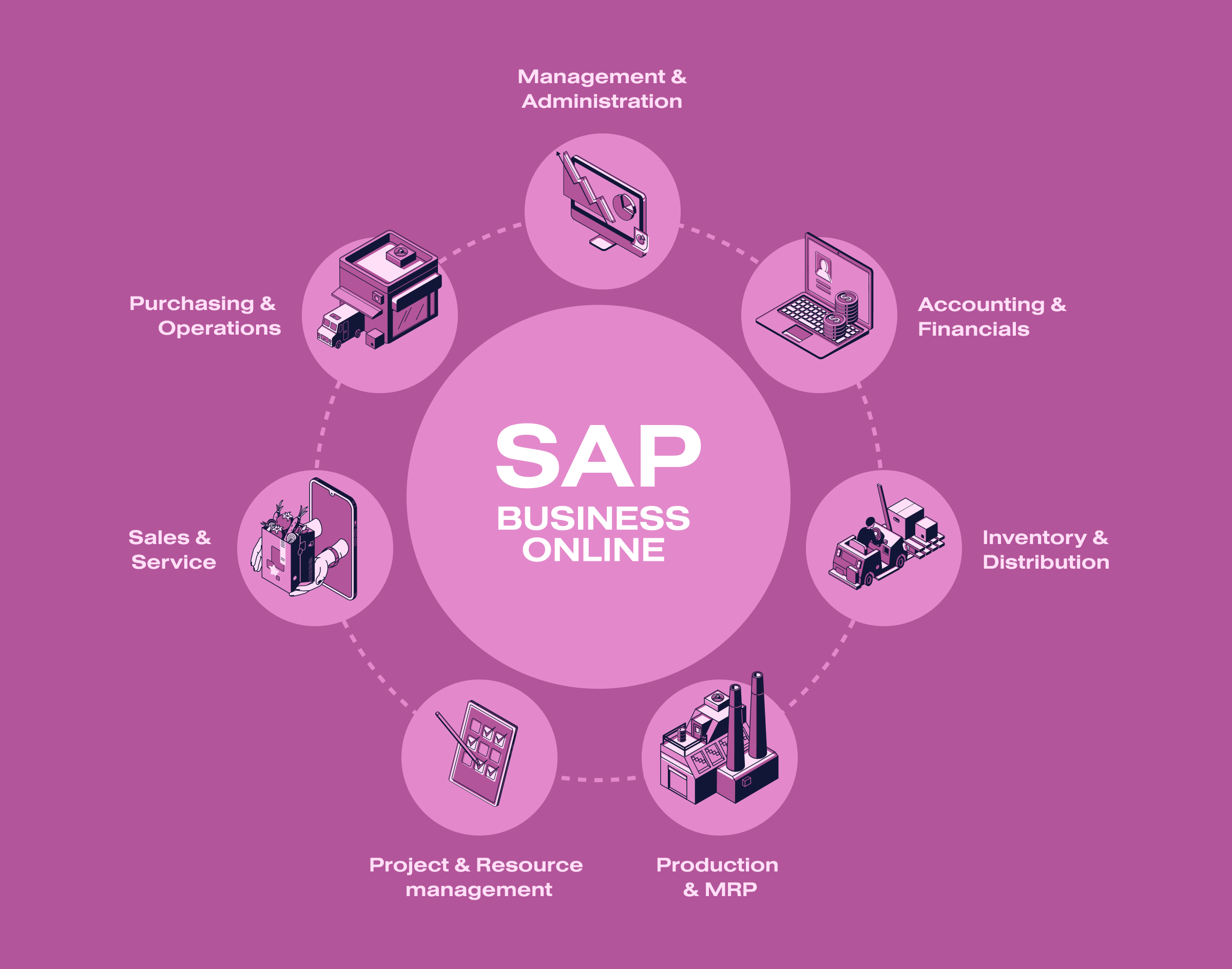Staying competitive and efficient is paramount. Companies across the globe are constantly seeking ways to streamline their operations, enhance productivity, and make informed decisions to drive growth. SAP is a powerful solution that has become a cornerstone of success for businesses of all sizes and industries. According to Zipdo, approximately 92% of the Forbes Global 2000 companies were SAP consumers in 2020. Moreover, 75% of SAP’s customers are small- and mid-sized businesses (SMBs), making up a significant portion of its user base.
This article discusses what SAP is, how the SAP system works, and how to implement SAP.
Key points
What is the SAP?

SAP is a program that allows you to conduct various business processes of the company: procurement, sales, production, and so on. However, SAP is not one specific product but a complex program that consists of modules. Each module is responsible for a separate business process. When switching to SAP, the business connects the modules needed.
Customized modules automate processes, which results in fewer errors in the work of employees, and the tasks themselves are solved faster. For example, if an accounting module is configured, an accountant does not need to prepare a report to the tax office manually. The program will do everything by itself. The accountant only has to send it to the Federal Tax Service.
Some of the pros of SAP include:
- Real-time operation. The manager changes the program data, and the new information is immediately reflected in the rest of the employees.
- Automation of routine processes. The program performs many tasks, thanks to which the number of errors in the work becomes less.
- Efficiency of employees’ work. Specialists are engaged in more complex and important tasks and do not waste time on one-type operations because SAP does them.
- Integration with other external programs and applications. This allows you to connect any office software to SAP.
Cons of SAP include:
- Difficult to set up. You need IT developers with experience setting up SAP.
- Employee training. The system is specific, so employees need to be trained to work with it.
- Additional costs. Unexpected costs may arise if you need to finalize the functionality to meet the requirements of the business.
If you need help with SAP implementation, we at SoloWay Tech can help you.
How does the SAP system work?
The system consists of 3 elements that ensure its operation:
- Client. This is a user application. The employee runs it on the computer and works through a customized interface.
- Server. This computer processes the program operations and sends the results to the client (user application). If the SAP is desktop-based, the server is located inside the company. If the web version of the program is used, the server is located at the SAP vendor.
- Database Management System. The DBMS manages the SAP database. It processes the information that employees have entered. System administrators and developers have access to the DBMS. Accountants, managers, and supervisors do not work in the DBMS, so they cannot access it.
SAP has desktop software and a cloud-based web version. But when an employee updates data in the program, they are immediately changed for other system users. It doesn’t matter which version is used in the office: desktop or virtual.
Where is SAP primarily used?
SAP’s flexibility and adaptability make it suitable for various industries. It is often customized to meet the specific needs of individual organizations. Here are three niches where SAP is primarily used:
- Public sector. SAP allows you to manage money settlements and budgets and keep records of the work of treasuries, administrations, and departments. For this purpose, the program creates a unified system in which management and financial information can be found for each state object.
- Logistics. Logistics companies keep records on the movement and loading of transport, calculate the cost of gasoline and car repair, and manage drivers’ work. Trade organizations can set up various business processes in SAP regardless of the business scale. They can be both small retail stores and large retail chains.
- Production. SAP is used in plants, factories, oil and gas, and power industries. The program allows you to keep records of production activities. We mean the purchase of raw materials and their processing, production of semi-finished and finished products, repair of equipment, and calculation of salaries to employees.
It’s important to note that SAP is a global leader in the ERP software market, and its applications are used by both large and small businesses worldwide.
What is included in the basic functionality of SAP and its add-ons?
SAP helps to systematize the work of the company’s business processes and automate routine operations that employees used to perform manually. For this purpose, the SAP system has basic and additional modules. The core modules include:
- Financial management
- Management of the company’s property
- Accounting
- Investment management
- Banking
- Logistics
- Personnel management
When the basic modules are installed, the company analyzes what other functionality it lacks. Each organization has the flexibility to combine only the modules it needs:
- Human capital management (SAP HCM)
- Production planning (SAP PP)
- Materials management (SAP MM)
- Project system (SAP PS)
- Sales and distribution (SAP SD)
- Plant maintenance (SAP PM)
- Finance and controlling (SAP FICO)
- Quality management (SAP QM)
So, SAP is a comprehensive software suite that helps organizations manage various aspects of their business operations, including finance, human resources, supply chain, manufacturing, procurement, and more.
How do we implement SAP at SoloWay Tech?
Implementation of the SAP system into the company’s work is as follows:
- Research. At this step, our SAP specialists study the business. They collect documentation and plan how SAP will be launched. For your part, you prepare the documents needed to purchase the program. Our SAP experts predict what difficulties may arise after the program is installed and find solutions in advance.
- Employee survey. At this stage, our SAP specialists interview the company’s employees to find out how business processes are organized at the current moment. After that, we select the necessary modules.
- Approval. Our SAP experts approve with the company’s management what program modules will be implemented. Everything is taken into account.
- Launch. Our SAP experts put the program into operation, but you cannot access it at once. Our SoloWay Tech team first checks the functionality, plays different scenarios, and checks the program’s operation under different users. Then, we make the final system settings and conduct staff training. After training, your employees get access to the program and start working with it.
SoloWay Tech is a team of diverse experts in numerous domains, uniting their powers to create the best solutions for over 15 years. When it comes to implementing and integrating the SAP system, we at SoloWay Tech are your go-to collaborators.
Future of SAP
Pivotal trends and advancements are poised to influence SAP’s trajectory profoundly. These include:
- Increased emphasis on cloud-centric solutions, exemplified by SAP S/4HANA
- Seamless integration of cutting-edge technologies like Artificial Intelligence (AI) and the Internet of Things (IoT)
- Bespoke development of industry-specific solutions
- Unwavering dedication to sustainability and Environmental, Social, and Governance (ESG) initiatives
- Intensified focus on interoperability and partnership with other platforms
- Substantial commitment to refining the user experience
These evolving trends underscore SAP’s dedication to delivering adaptable, scalable, and forward-thinking solutions that cater to the distinct requirements of various industries while championing sustainability and elevating user contentment.
Conclusion
Here are the takeaways from our article:
- SAP is a software package that consists of modules. Modules are interconnected and allow you to organize all company processes. This includes sales, purchases, warehouse management, accounting and tax accounting, logistics, etc.
- SAP has modules necessary for running a business: accounting, finance, personnel management, purchasing, and sales. However, the company can purchase additional modules from SAP if the basic modules are insufficient.
- SAP is used by companies from various spheres: banking, public sector, trade, logistics, production, etc.
- When implementing the program in a company, our SAP experts first analyze the work of the business, design the system, configure it, check for errors, and only then put it into operation.
Implementing the SAP system can take a long time. Very few businesses can carry out such integration on their own. They need the help of the development team and their own IT specialists or digital partners. We at SoloWay Tech are always here to help you!





